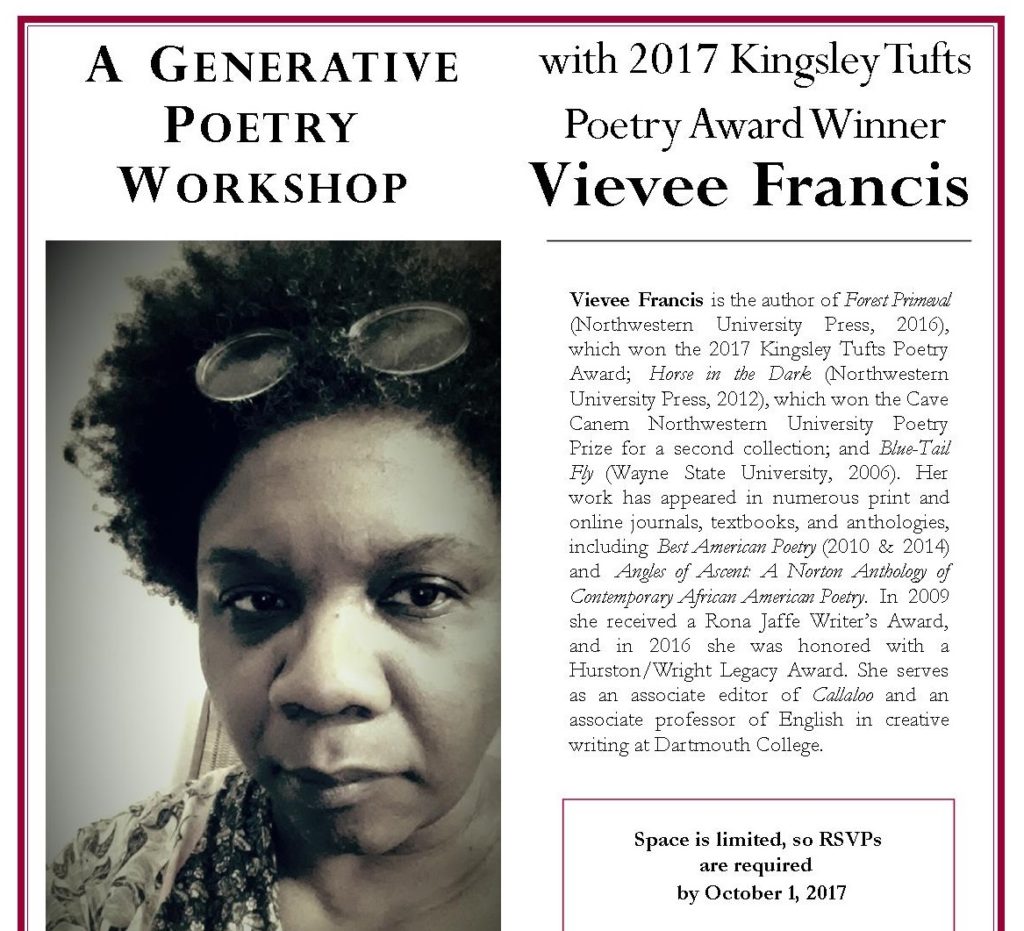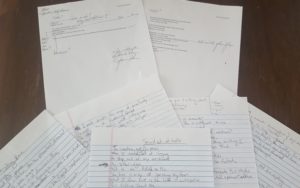Vievee Francis, the Poetry Workshop, and the Future

If there is one thing I have learned in my graduate school career, it is that the hardest (but most important!) job of any critic or scholar is to be able to correctly diagnose the poetry moment of their own time. Edmund Bolton declared that he “never tasted English more to my liking, nor more smart, and put to the height of Use in Poetry, then in that vital judicious, and most practicable Language” of Ben Jonson. Later, Jonson would be known as the father of cavalier poetry, to the extent that the movement is sometimes called the “Tribe of Ben.” Ezra Pound befriended, promoted, edited, and helped to publish many of the key Modernist figures we know today: James Joyce, T. S. Eliot, and Robert Frost. Pound sought “to keep alive a certain group of advancing poets, to set the arts in their rightful place as the acknowledged guide and lamp of civilization” (from a 1915 letter to Harriet Monroe).
So who is our lamp? Who puts language to the height of use today? Former Kingsley & Kate Tufts Poetry Awards director Dr. Wendy Martin once said that this distinction goes to Vievee Francis. And from my perspective, anyone who attended Vievee’s workshop during her week in residence would be compelled to agree. Dr. Martin is right. Vievee Francis is “it,” and working with her for a single morning made this infinitely clear.
Vievee’s workshop was simultaneously a creative writing opportunity and a lesson in contemporary poetry. A few weeks before the workshop, she asked each attendee to submit two poems to her. She began the session by debunking the notion of the poem as a riddle. She warned us that the riddled poem risks disengaging the audience, and also against getting swept up in the beauty of our own lines. Beauty and cleverness are secondary, always, to meaningfulness. She urged us toward vulnerability, specificity, and clarity in our work. To that end, she assigned us all a rewrite with personalized instructions. My rewrite involved removing or naming all vague pronouns and unspecified figures, answering all unanswered questions, and titling the piece. I went through four drafts in about 45 minutes, and each draft unpacked a particular theme from the original piece. In the final draft, I followed my original structure and anywhere I had previously been vague, I inlaid all the rewrites I’d done.

We shared our rewrites with partners Vievee assigned to us, and we offered peer review. Then, the nine of us returned to a seminar formation, and we read the new drafts to Vievee. One by one, she gave us feedback. She reminded us to select only relevant details, and to prune all redundancies and distractions—to say only the “thing.” She tightened lines. She retitled. She pointed to both shining moments and missed opportunities. She chastised us against old cliches: “the beautiful woman as the muse in the attic? We’re not in 16th century Britain! And what about those of us that image doesn’t work for? What about those of us who aren’t compelled by or attracted to a woman’s beauty? Why are they writing like a British guy from way back? It is our capacity, and I think our duty, as poets to redefine what is beautiful. You should challenge the old conventions in some way. You should find a way to do that in your poem.”
I thought I’d burst with pride as she offered me her feedback. She had me read the poem twice—the second time, more solemnly. When I was finished, she nodded. “This is an extraordinary rewrite. You did exactly what I asked,” she said. “I have a few nips and tucks.” Her feedback for all of us was highly personalized—filled with references to poems she thought related to our work, anecdotes about her husband, examples of creatively generative sources in her own life. I had never thought about poetry the way she described it. Poetry is an opportunity to say something true, something specific, personal and narrative. But poetry is also elevated by the lack of constraints; it is free to run wild and away from the sentence, the plot structure, the need for character development. Vievee insisted we provide a sense of time and place in each poem, but she did not mean it in the sense that fiction writers seem to. We were not to, necessarily, list the geographical location, describe the setting, or to give the characters context. Instead, our instructions lead us to place our poetry in a moment—a real moment, a specific moment—in our lives, thoughts, or imaginations.
Vievee described herself as a “writer who teaches.” And if we wanted to be writers as well, she gave us this advice. Simply, no matter how much we read, we do not read enough—in fact, she assigned us each two living writers to look up after the session, to help us place our work in context with contemporaries who do similar work. She lambasted the dearth of formal, academic study of contemporary poets. “Academics like their poets nice and dead,” she told us, reprovingly.
Only a person with her finger on the pulse of the moment could have spoken to us the way she did about how to transform our work. She explained so clearly what poetry is supposed to do. Both an expert and an experimental philosopher, Vievee dazzled, because her workshop provided just a peek into the new world. It’s a brave place, full of strong, sensuous voices telling unswerving stories. This world that has broken the yoke of form, and it has domesticated (not entirely deserted) formerly prescriptive poetic norms.
At the end, she offered us her email address and made us swear to send her the finished drafts. Dazed, I wandered away with my scribbled out drafts, author recommendations, and workshop notes on sheets of lined paper. I hope, when I am dead, a critic finds these notes and archives them. I would be honored to be recorded primarily as the person who wrote in a margin, “Vievee Francis makes me believe I can see into the future. The future is the tender specificity, the new age of love poetry, the burst open sonnets of Vievee Francis.”
—Kelly Eisenbrand
Share